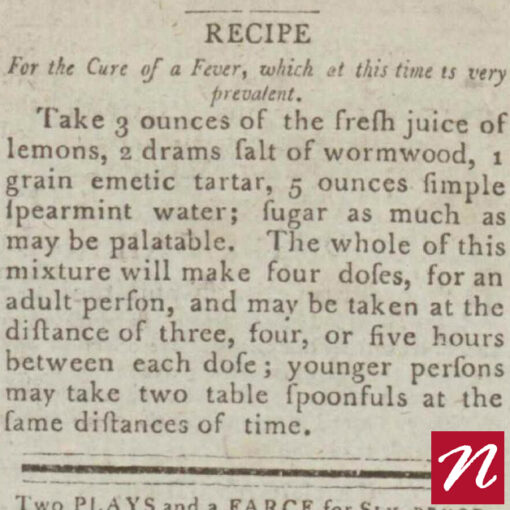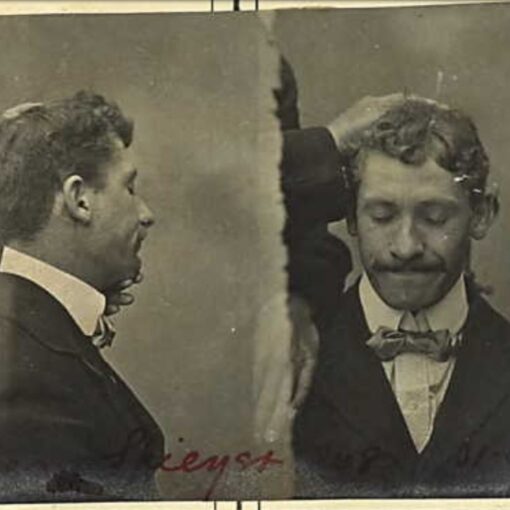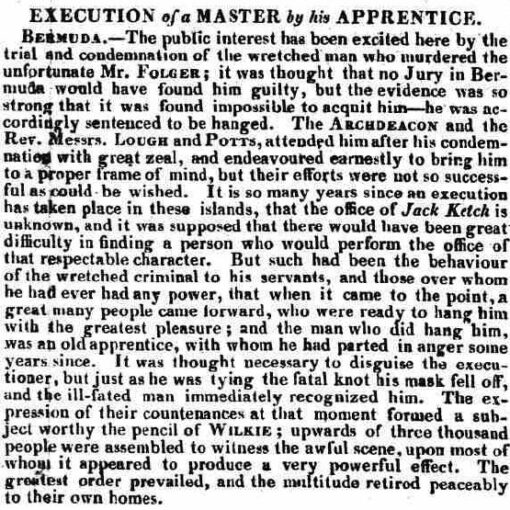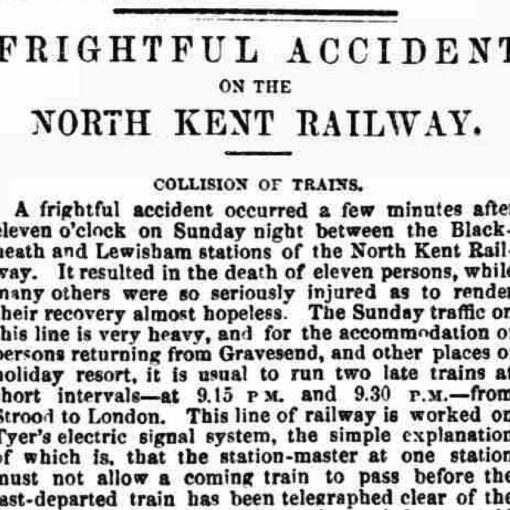Some readers may find the following editorial and historic news report disturbing.
The acquisition of dead bodies in modern times might well sound quite revolting and hugely inappropriate. But up until the first half of the 19th century, such was the demand by Physicians and doctors to teach students of medicine. The exploration factor of the human body particularly in the Georgian era and the acquisition of a body for such work was regarded as premium. For some, it was big business.
The legality of such activity was complex during this period although as the following article from the Sussex Advertiser in 1823 clearly shows, measures were underway to fulfil the corpse requirement of medical professionals through the use of bodies of those executed.
“Body snatching” as it was, and still is, commonly known was a common occurrence especially as some ruthless medical practitioners could pay a premium for a fresh corpse in order to conduct their work and exploration.
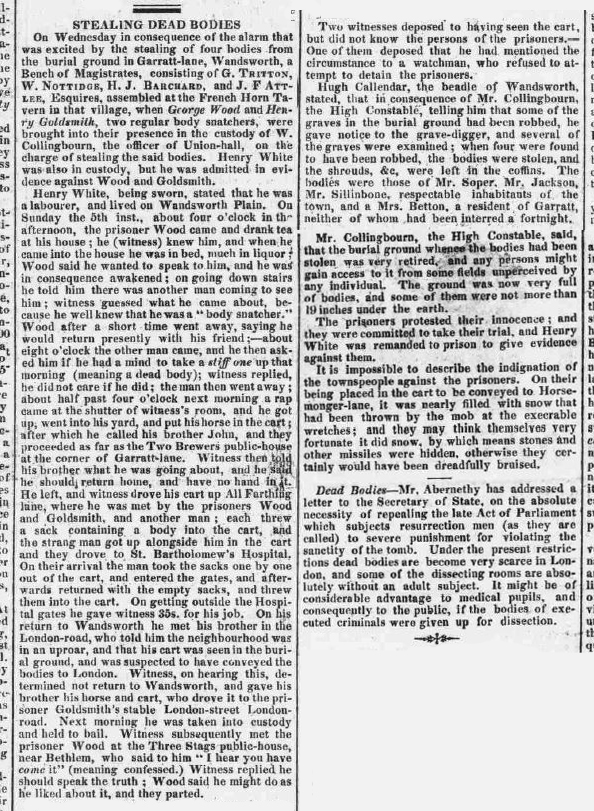
Here is the article from the 20th of January, 1823:
Stealing Dead Bodies
“On Wednesday in consequence of the alarm that was excited by the stealing of four bodies from the burial ground in Garratt lane, Wandsworth, a Bench of Magistrates, consisting of G. Tritton, W. Nottidge, H.J. Barchard and F.J. Attlee, Esquires, assembled at the French Horn Tavern in that village, when George Wood and Henry Goldsmith, two regular body snatchers, were brought into their presence in the custody of W. Collingbourn, the officer of Union Hall, on the charge of stealing the said bodies. Henry White was also in custody, but he was admitted in evidence against Wood and Goldsmith.
Henry White, being sworn, stated that he was a labourer, and lived on Wandsworth Plain. On Sunday the fifth instant about 4.00 in the afternoon, the prisoner Wood came and drank tea at his house; he (witness) knew him, and when he came into the house he was in bed, much in liquor Wood said he wanted to speak to him, and he was in consequence awakened; on going down stairs he told him there was another man coming to see him; witness guessed what he came about, because he well knew that he was a “body snatcher”. Wood after a short time went away, saying he would return presently with his friend; -about 8.00 the other man came, and he then asked him if he had a mind to take a stiff one up that morning (meaning a dead body); witness replied, he did not care if he did; the man went away; about 4.30 o’clock next morning a rap came after shutter of the witness’s room, and he got up, went into his yard, and put his horse in the cart; after which he called his brother John, and they proceeded as far as the Two Brewers public house at the corner of Garratt lane. Witness then told his brother what he was going about, and he said he should return home, and have no hand in it.
He left, and witness drove his car and up All Farthing Lane, where he was met by the prisoners Wood and Goldsmith, and another man; each through a sack containing a body into the cart, and the strang man got up alongside him in the cart and they drove to St Bartholomew’s Hospital. On their arrival the man took the sacks one by one out of the cart, and entered the gates, and afterwards returned with the empty sacks, and threw them into the cart.
On getting outside the hospital gates he gave witness 35 shillings for his job. On his return to Wandsworth he met his brother in the London road, told him the neighbourhood was in an uproar, and that his cart was seen in the burial ground and was suspected to have conveyed the bodies to London. Witness, on hearing this, determined not to returned to Wandsworth, and gave his brother his horse and cart, who drove it to prisoner Goldsmith stable London street London road. Next morning he was taken into custody and held to bail. Witness consequently met the prisoner Wood after Three Stags public house, near Bethlem, who said to him “I hear you have come it” (meaning confessed.” Witness replied he should speak the truth; Wood said he might do as he liked about it, and they parted.
Two witnesses deposed to having seen the cart, but did not know the persons of the prisoners. –one of them deposed that he had mentioned the circumstance to a watchman, who refused to attempt to detain the prisoners.
Hugh Callendar, the beadle of Wandsworth, stated, that in consequence of Mr Collingbourn, the High Constable, telling him that some of the graves in the burial ground had been robbed, he gave notice to the gravedigger, and several of the graves were examined; when four were found to have been robbed, the bodies were stolen, and the shrouds &c., were left in the coffins. The body as were those of Mr. Soper, Mr. Jackson, Mr Sillinbone, respectable inhabitants of the town, and a Mrs Betton, a resident of Garratt, neither of whom had been interred a fortnight.
Mr. Collingbourn, the High Constable, said, that the burial ground whence the bodies had been stolen was very retired, and any persons might gain access to it from some fields and perceived by any individual. The ground was now very fall of bodies, and some of them were not more than 19 inches under the earth.
The prisoners protested their innocence; and they were committed to take their trial, and Henry White was remanded to prison to give evidence against them.
It is impossible to describe the indignation of the townspeople against the prisoners. On their being placed in the cart to be conveyed to Horsemonger lane, it was nearly filled with snow that had been thrown by the mob at execrable wretches; and they may think themselves very fortunate it did snow, by which means stones and other missiles were hidden, otherwise they certainly would have been dreadfully bruised.”
____
“Dead Bodies – Mr Abernethy has addressed a letter to the Secretary of State, on the absolute necessity of repealing late Act of Parliament which subjects resurrection men (as they are called) to severe punishment for violating of the sanctity of the tomb. Under the present restrictions dead bodies are become very scarce in London, and some of the dissecting rooms are absolutely without an adult subject. It might be of considerable advantage to medical pupils, and consequently to the public, if the bodies of executed criminals were given up for dissection.”

